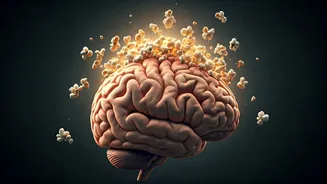Defining Popcorn Brain
The term 'popcorn brain' has emerged to describe a state of the mind characterized by rapid, erratic thoughts and a diminished ability to focus. The underlying
premise is that constant exposure to digital content, social media, and multitasking trains the brain to crave continuous stimulation. This constant shift from one stimulus to another can make sustained attention and deep thinking difficult. As a result, individuals may find themselves struggling with tasks that require extended concentration, memory retention, and the ability to think critically. The term itself is metaphorical, suggesting that the brain is like popcorn, constantly popping with fleeting thoughts and ideas, never settling on one for an extended period. This phenomenon is more than just a fleeting distraction; it potentially undermines productivity and overall cognitive health.
Symptoms and Manifestations
Identifying 'popcorn brain' syndrome can be complex, as its symptoms often overlap with other conditions such as ADHD or anxiety. However, some key indicators can help in recognizing it. These include difficulty concentrating on tasks, frequent mind-wandering, and an inability to resist distractions like checking social media. Individuals may also experience a feeling of mental restlessness, a sense of constantly being overwhelmed by thoughts, and difficulty in organizing thoughts effectively. Furthermore, people might show a reduced ability to prioritize tasks, leading to procrastination or switching between tasks without completing any of them. Poor memory recall and difficulty in retaining information are also common signs. The symptoms can vary in intensity and frequency, depending on the individual and the level of digital exposure.
Digital Age Influence
The proliferation of digital technologies has profoundly influenced how our brains function. Social media platforms, with their endless streams of information and notifications, are designed to capture and hold our attention. Short-form video content, such as TikTok, further exacerbates the problem by offering instant gratification and requiring minimal attention spans. Similarly, the constant availability of information via the internet allows for immediate access to various sources but can also lead to information overload. Our brains, wired for survival, are naturally drawn to novelty and immediate rewards. The digital environment exploits these tendencies by offering a continuous flow of stimulating content, ultimately leading to a shift in cognitive patterns. This sustained exposure to digital stimuli can reshape the brain, favoring shorter attention spans and quicker shifts in focus.
Impacts on Daily Life
The effects of 'popcorn brain' syndrome can be far-reaching, impacting various aspects of daily life. In academic settings, students may struggle with completing assignments, retaining information, and performing well in exams. At work, individuals might experience decreased productivity, difficulty in meeting deadlines, and an overall decline in job performance. Relationships can also be negatively affected as individuals may find it difficult to fully engage in conversations or maintain a strong presence with others. Furthermore, mental health can be significantly impacted, with increased levels of stress, anxiety, and a feeling of being constantly overwhelmed. The consequences of 'popcorn brain' can manifest in reduced efficiency, a decreased ability to experience meaningful experiences, and a decline in overall quality of life.
Strategies for Mitigation
Addressing 'popcorn brain' syndrome requires adopting conscious strategies to manage and mitigate its effects. One of the most effective methods is to limit digital exposure. This involves setting specific times for checking emails, social media, and other online content and adhering to those limits. Another strategy is practicing mindfulness and meditation. These practices can help improve focus, calm the mind, and increase awareness of one's thoughts. Furthermore, incorporating regular breaks into work and study sessions can help the brain rest and prevent cognitive fatigue. Engaging in activities that promote deep focus and concentration, such as reading, solving puzzles, or pursuing hobbies, is crucial. Moreover, it is helpful to cultivate a balanced lifestyle, including proper sleep, a healthy diet, and regular exercise to improve overall cognitive function and resilience.
Seeking Professional Help
While self-help strategies can be beneficial in managing 'popcorn brain' syndrome, seeking professional help is highly advisable in cases where symptoms are severe or persistent. A psychologist can provide a comprehensive assessment to determine the extent of the issue and rule out any underlying conditions. Therapy, particularly cognitive-behavioral therapy (CBT), can be an effective approach to help individuals develop strategies for managing their thoughts, improving focus, and modifying their behaviors. A psychologist can also provide tailored guidance based on individual needs and circumstances. The support of a mental health professional can provide valuable assistance in understanding the roots of the problem and developing coping mechanisms to regain control over cognitive function and overall well-being. Additionally, a professional can explore whether any other health concerns are present.
















